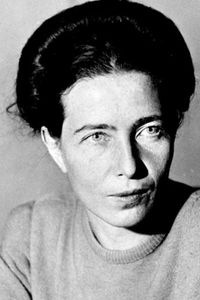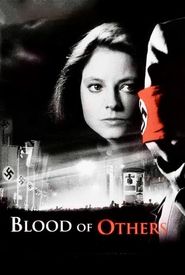Simone Ernestine Lucie Marie Bertrand de Beauvoir was born on January 9, 1908, in Paris, France. Raised in an upper-class bourgeois Catholic family, her father, Georges de Beauvoir, had a passion for books and theatre. He taught Simone reading at the age of 3, and she attempted to write as soon as she could read. Her early development was that of a remarkably talented child.
Her bold and spontaneous classmate, Zaza (Elisabeth Le Coin),was her earliest and strongest friendship. Beauvoir and Zaza were both students of Maurice Merleau-Ponty, whom Zaza loved. That relationship was disrupted by Zaza's controlling parents. Zaza died of encephalitis at age 20, leaving Beauvoir shocked and depressed. Zaza's short life was described by Beauvoir in several versions and in various literary forms, revealing Beauvoir's own post-traumatic scars. As Beauvoir was trying to soothe the pain of loss, she drifted away from the restrictive social order of French class society.
She was a Sorbonne student when she met Jean-Paul Sartre at the study group in 1929. At that time, she was nicknamed 'Castor' (Beaver),with the dual meaning of her last name as English for the animal and its reputation as a dedicated worker. Beauvoir and Sartree both learned to hate the restrictions of upper-class life. Both favored an 'authentic state of being'. Her rebellious nature played a painful role in their relationship from the very start. Knowing that her teaching assignment would separate them, Jean-Paul Sartre proposed to her. His proposal and marriage would lead to their teaching assignments in the same area. To his dismay, she turned down his proposal and left.
In 1932 Beauvoir was teaching in Rouen. There, she met Olga Kozakiewich and began a relationship. In 1935, she introduced Sartre to her 18-year-old student Olga Kozakiewich, and the three formed the 'family'. Beauvoir merged both relationships into a trio, which led to an unexpected and overwhelming outcome. While she imagined the trio would illustrate the 'authenticity' of their relationships, in reality, the inevitable competition from the younger and independent-minded Olga became a growing threat. Beauvoir saw Olga as an object, a mere cast member of the game. She also overestimated her own tolerance. Eventually, the trio failed before the challenge to reciprocate in recognition of each one's 'authentic' consciousness. Each member wrote a different account of the same events in their 'family' life.
While her academic studies focused on the role of individual choice, the realities of her private life conflicted with her theory. The scenario that caused her earlier traumatic experience of her separation from Zaza was being replayed with variations. Beauvoir continued experimenting with her 'open family' by including her other students and Sartre's students too. Other family member's 'authentic' consciousness added to social inventiveness and a sort of group-therapy during the occupation of Paris in WWII. "Existence causes transformation of consciousness" - commented Jean-Paul Sartre.
The Jean-Simone-Olga 'family' affair is immortalized in her first novel 'L'Invitee' (She Came to Stay, 1943). At that time, they were living in an occupied Paris. The open 'family' included several former students of both Beauvoir and Sartre; forming a unique social group with Olga Kazakiewich, Nathalie Sorokine, and Jacques-Laurent Bost. The complex manner of relationships in the 'family' was somewhat based on the intellectual connection between students and teachers, who also included sharing of cooking and other domestic duties. Beauvoir was forced into a rare experience of cooking only during the war, while being unencumbered with domestic duties for the rest of her life. The author of 'The Second Sex' ate at cafés and lived in good hotels, always being served.
Sartre and Beauvoir traveled to the South of France where they wooed André Gide and André Malraux to their underground group 'Socialisme et Liberte'. Their active resistance soon turned into writing for 'Combat', published by 'Albert Camus'. In 1945, Beauvoir joined the editorial staff at 'Les Tempes Modernes', a leftist journal named after the Chaplin's film. Sartre, being the magazine's founder among other intellectual friends, published Beauvoir's works first, giving her a steady platform and publicity. At that time, she published 'Le Sang des Autres' (The Blood of Others, 1945),a reflection of Resistance during WWII. Her friend 'Albert Camus' wrote a positive review on Beauvoir's book. Her only play 'Les Bouches Inutiles' (Useless Mouths, 1945) was also


















